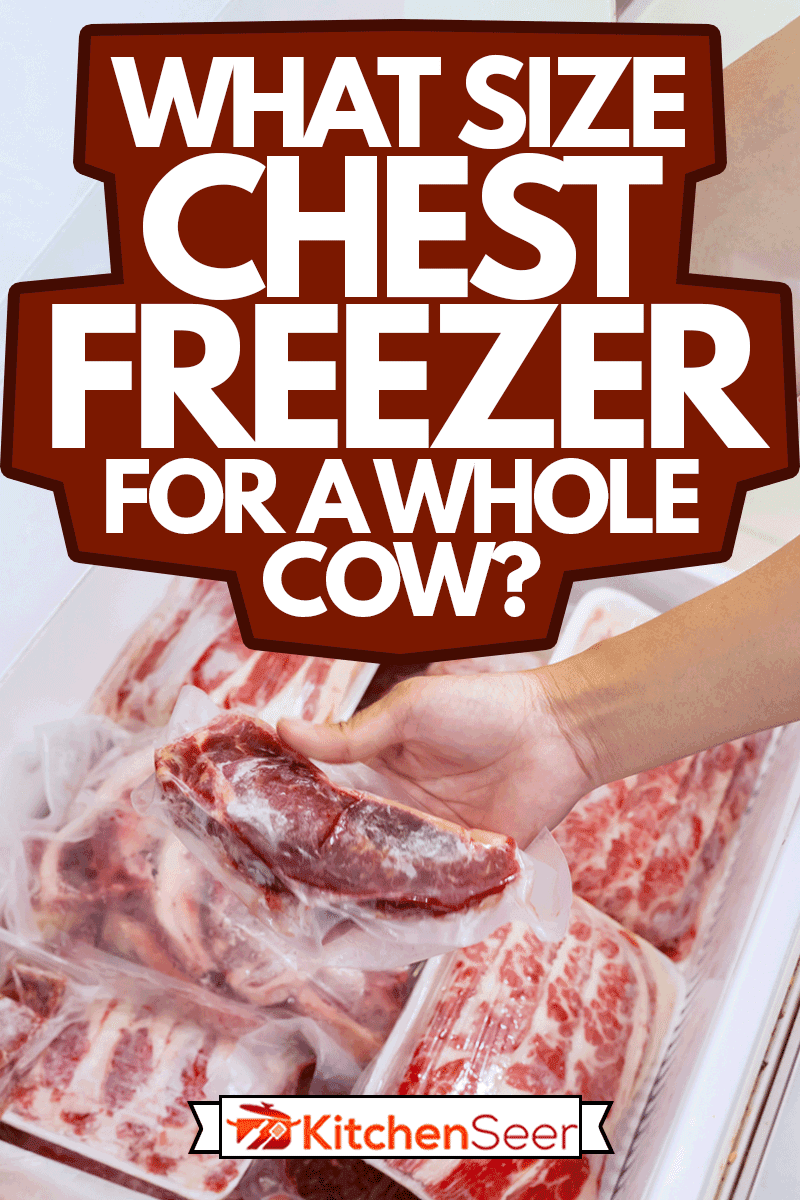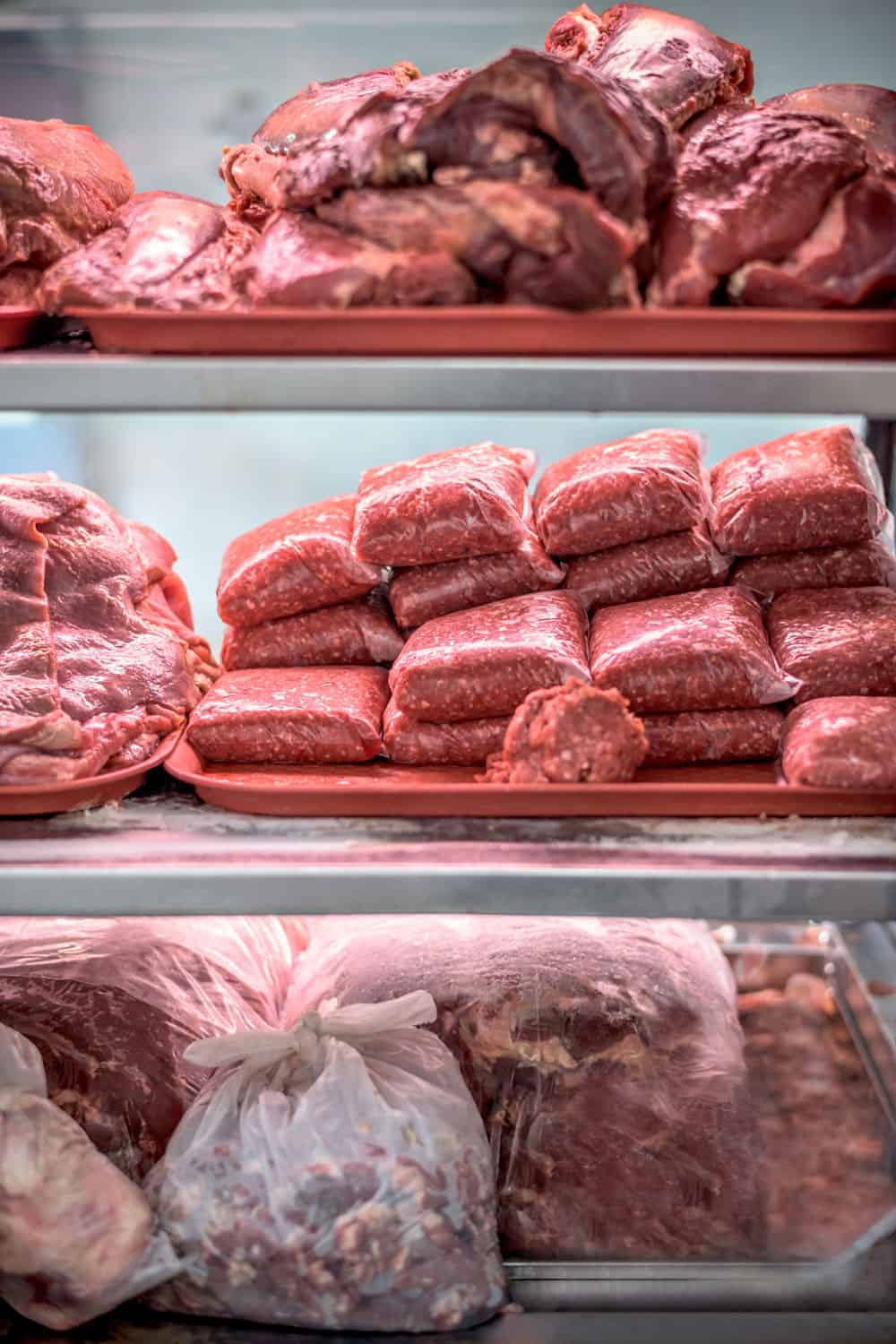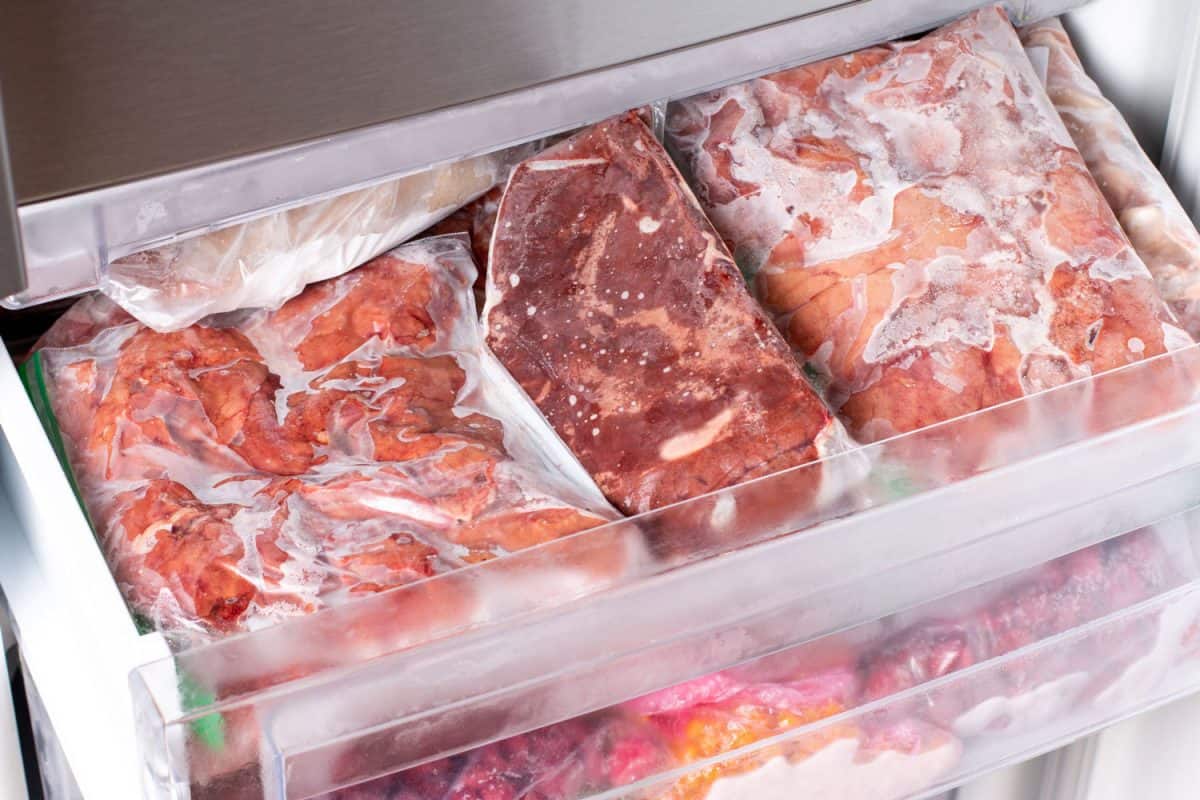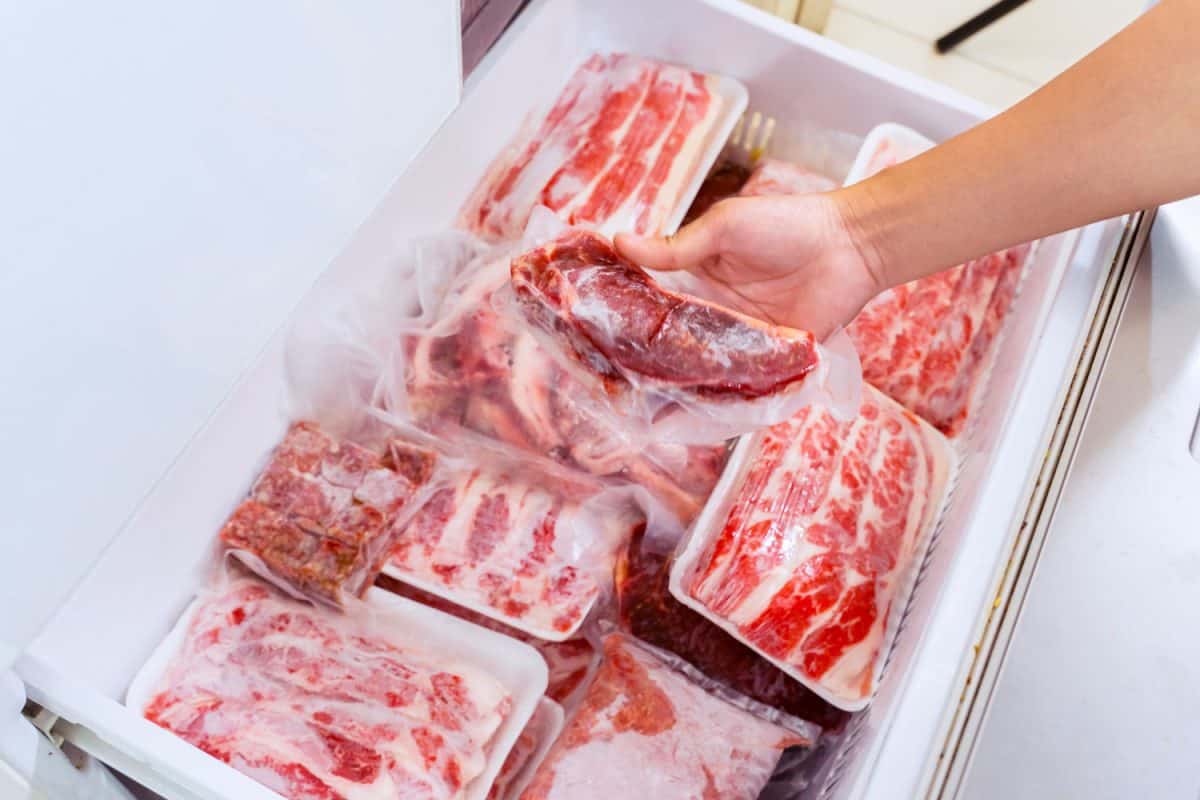How Many Cubic Feet of Freezer Is 14 Side of Beef
Disclosure: We may get commissions for purchases made through links in this post.
Purchasing a whole cow and having it processed at a local processing facility is a great way to avoid many of the preservatives found in grocery store meats. It's also a way to save money while supporting farmers and boosting the local economy at the same time. However, you need a way to store the meat until you are ready to use it. The best option is a freezer, but you may be wondering what size is needed to hold a whole cow. We have done some digging and found the answer.
The freezer size to hold a whole cow depends on the size of the cow, the cuts of meat, and the packaging. However, you can expect that a whole cow that weighs approximately 1200 pounds before butchering yields around 500 pounds of meat. This amount of meat needs a large freezer of around 20 cubic feet.
Keep reading to find out more information about having your beef processed. We will take a look at the freezer size required for different amounts of meat and tips and tricks for making sure your beef still tastes great when you are ready to prepare it.

Freezer Storage
A general rule of thumb states that one cubic foot of freezer space holds 25 pounds of processed and packaged meat for freezer storage. We answer questions about different beef quantities and the freezer capacity required to store the various amounts using that calculation.
What Size Freezer do I Need for 300 lbs of Meat?
Based on the previously stated rule of thumb, 300 lbs of meat would require a freezer of at least 12 cubic feet. This amount of frozen meat would need a medium freezer to have adequate storage space.
What Size Freezer do I Need for 250 lbs of Meat?
For 250 lbs of meat, you should expect that you would need a freezer with a capacity of at least ten cubic feet. This quantity of meat would need a medium freezer, leaving plenty of leftover space for other frozen items.
How Big of a Freezer do I Need for 150 lbs of Meat?
For 150 lbs of meat, the freezer space needed would be at least six cubic feet. For this amount of frozen meat, a small freezer would be sufficient and still allow you to have some room for other frozen items.
Styles and Sizes for Freezers
Freezers typically come in two styles, chest and upright. To determine which one is right for you, consider the space you have to put it and the capacity required. While the overall cubic foot capacity may be the same, the dimensions of each one are very different. This difference matters when you consider the size and shape of your frozen goods.
Freezers have a size range that includes compact, small, medium, and large. Freezer capacity descriptions are in cubic feet. Below is each category with the cubic feet capacity and dimensions for each variety.
- Compact (3-5 cubic feet), upright = 20–24″ W x 31–37″ H x 20–25″ D, and chest = 21-28" W x 32-34" H x 19-22" D
- Small (5-9 cubic feet), upright = 21–25″ W x 55–60″ H x 22–26″ D, and chest = 29–38″ W x 32–34″ H x 22–27″ D
- Medium (10-16 cubic feet), upright = 23–30″ W x 60–73″ H x 27–30″ D, and chest = 54–65″ W x 33–36″ H x 24–28″ D
- Large (17+ cubic feet), upright = 27–33″ W x 64–76″ H x 29–30″ D, and chest= 72–84″ W x 31–34″ H x 27–32″ D
Things to Consider When Purchasing a Whole Cow
As mentioned earlier, a cow that weighs approximately 1200 pounds will yield a hanging weight of around 750 pounds. From that carcass, the butcher will be able to package about 500 pounds of meat. You can expect to take home approximately 60% of a cow's hanging weight in processed meat. So for an average cow, between 440-500 pounds of beef is a reasonable expectation when purchasing a whole cow.
Meat Cuts and Quantity
Using the 500 pounds of packaged beef example, the cuts you can expect to receive from the processing facility would look very similar to the approximate amounts below unless you specify that you prefer that that some of the standard cuts are processed into ground beef.
- 200 lbs of ground beef
- 80-90 lbs round roasts and steaks
- 90 lbs chuck roasts and steaks
- 80 lbs rib and loin steaks
- 50 lbs other cuts (brisket, flank, short ribs, skirt steak)
In addition to your meat cuts, there's an additional 250 pounds of trim fat and bones which some people prefer to get back to use for beef stock and seasoning. If you plan to keep and freeze these additional parts of your whole cow, you can expect that it would require an additional ten cubic feet of freezer space.
Cost
When considering purchasing a whole, half, or quarter of a beef, one should expect a considerable upfront cost. But in the long run, you should see cost savings. There is the initial cost to the farmer for the cow. Then, you will pay the processing plant for butchering, packaging, and disposal of your beef. The overall cost will vary based on your location, so you should call ahead to your local processing facilities to inquire about the per-pound price and any additional fees.
How Much Meat is in a Quarter Cow?

When purchasing a quarter of a cow or split half, you can expect that you will receive approximately 100 pounds of beef, depending on the original weight of the cow. This amount is an excellent quantity for two people and requires about 3.5 cubic feet of freezer space.
Expect the standard selection of meat cuts to include the following: chuck roast, rib steaks, a rump roast, round steaks, sirloin tip steaks, top sirloin steaks, tenderloin steaks, filet steaks, T-bone steaks, a small brisket, a couple of pounds of soup bones, stir fry/fajita steak, liver boneless stew meat, short ribs, and about half the weight in ground beef. One customer gets the option to receive the tongue, heart, or oxtail if these are parts that interest you.
How Long does Beef Last in the Freezer?

How long your beef will last in the freezer depends on how the meat is packaged before going into the freezer. If you don't package food correctly, air can get to it. Air is an enemy to frozen meat. Exposure to air deteriorates the quality of the meat.
According to the USDA, food that is continually frozen remains safe to eat indefinitely. However, the meat will begin to lose flavor after an extended time. Freezer burn is a concern when meat is not appropriately packaged and significantly affects taste and texture. While the meat may not harm you, it won't taste good and is considered to be inedible by most. To get the best results from your frozen beef, you should make the best attempt to use it within a year.
The long-term quality of your frozen beef depends heavily on the packaging you choose. You want to package your beef in a way that offers the most protection for the meat. From a processing plant, you can expect the options of shrink wrap, butcher paper, or vacuum sealing.
Vacuum sealing is one method that has gained popularity in recent years and yields the best long-term results. Shrinkwrap is fine when the meat is quick. Butcher paper is appropriate for the freezer but is really only best for short-term freezing.
If you need a vacuum sealer, consider the top-rated Food Saver Starter Kit.

Click here to find this vacuum sealer on Amazon.
Is it Better to Freeze Meat Raw or Cooked?
Either method works for freezing meat. However, when purchasing a cow that yields a large amount of meat, it would not be practical to cook it before freezing. You would freeze the meat you aren't going to use immediately in the packages from the processing facility.
Suppose you have leftover meat after cooking. There's no need to throw it out. You can freeze it and then thaw it when you are ready to use it again. There are several myths about freezing meat that may keep people from using this method of food preservation. Freezing meat shouldn't be a concern. Just follow the USDA guidelines for freezing and food safety.
Summary

Purchasing a cow from a local source helps your local economy and allows you to source an organic product for your beef needs. Just prepare to store a large amount of meat which requires having adequate freezer space available. Based on the information in this article, you should have an idea of the freezer capacity needed for the quantity of beef you plan to purchase.
For more information about owning a freezer, read Where Should I Put My Freezer? 10 Locations To Consider
Also, consider How Big Is The Typical Freezer? 4 Sizes Explained
Source: https://kitchenseer.com/size-chest-freezer-for-whole-cow/
0 Response to "How Many Cubic Feet of Freezer Is 14 Side of Beef"
Postar um comentário